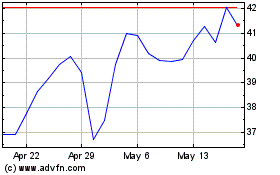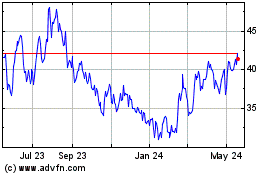Hong Kong Wins More Listings of U.S.-Traded Chinese Firms -- Update
10 September 2020 - 7:28PM
Dow Jones News
By Joanne Chiu
The tally of U.S.-listed Chinese companies securing alternative
listings in Hong Kong grew, as stock in China's largest restaurant
group started trading in the city and a major hotel chain began
taking orders for its own offering.
Yum China Holdings Inc., which runs KFC and Pizza Hut on the
mainland, made a lackluster debut days after it had raised the
equivalent of $2.2 billion by selling new stock.
Separately, Nasdaq-listed hotelier Huazhu Group Ltd., which
counts Accor SA and Trip.com Group Ltd. as shareholders, began
taking orders for a $970 million stock sale ahead of its planned
secondary listing in Hong Kong on Sept. 22.
The new deals follow a string of sizable stock sales in Hong
Kong by big Chinese technology companies whose securities already
trade in New York, such as Alibaba Group Holding Ltd., JD.com Inc.
and NetEase Inc.--and show such secondary listings also hold appeal
for companies outside the tech industry.
A Hong Kong listing means a company's stock can be traded during
the Asian day and is likely to broaden its investor base. If shares
are later added to Hong Kong's so-called stock connect program,
they could also become accessible to investors in mainland
China.
At the same time, American lawmakers have sought to step up
financial scrutiny of U.S.-listed Chinese companies, raising the
risk of potential delistings. And Hong Kong's stock exchange has
also revamped its rules to allow some Chinese companies whose
shares already trade on other exchanges to list in the city.
Yum China's stock fell 5.3% from its offer price on Thursday to
close at 390.20 Hong Kong dollars, the equivalent of $50.34. Its
New York-traded stock closed Wednesday at $53.20.
The lukewarm market reception came even though Yum China's stock
sale generated solid demand. Individual investors placed more than
52 times the stock offered to them, while institutions ordered
nearly nine times more shares than they were offered.
Paul Pong, managing director at Pegasus Fund Managers Ltd., said
investors liked Yum China's growth prospects and saw the company,
which was spun off from Yum Brands Inc. in 2016, as
well-managed.
"China's market is far from saturated for Yum China, giving it a
lot of growth potential for new store openings," he said. However,
Mr. Pong said any resurgence of coronavirus infections in the
winter could slow Yum China's recovery, even if its long-term
potential remained intact.
Lockdowns and social-distancing measures forced the company to
close about a third of its restaurants earlier this year. Yum China
has since reopened most stores but said sales and profits were
trending unevenly. Net income fell 26% to $132 million in the
second quarter and its sales fell 11% from a year earlier to $1.9
billion.
P.R. Venkat contributed to this article.
Write to Joanne Chiu at joanne.chiu@wsj.com
(END) Dow Jones Newswires
September 10, 2020 05:13 ET (09:13 GMT)
Copyright (c) 2020 Dow Jones & Company, Inc.
H World (NASDAQ:HTHT)
Historical Stock Chart
From Jun 2024 to Jul 2024

H World (NASDAQ:HTHT)
Historical Stock Chart
From Jul 2023 to Jul 2024
